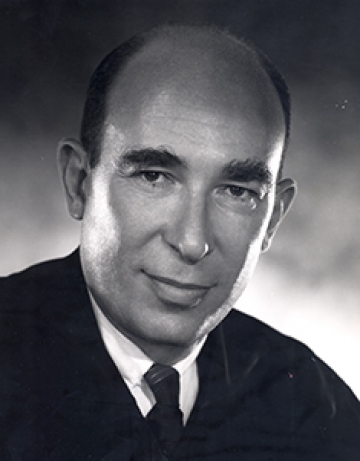Wilfred Feinberg, Venerable Federal Jurist and Distinguished Law School Alumnus, Dies at Age 94
The venerable federal jurist who served on the bench for more than five decades passed away at the age of 94.
Wilfred “Bill” Feinberg, a venerable federal jurist who served on the bench for more than five decades, passed away on July 31, 2014, at the age of 94.
Feinberg began his distinguished judicial career in 1961 when President John F. Kennedy appointed him a judge on the U.S. District Court for the Southern District of New York. After five years on the district court, Judge Feinberg was elevated to the U.S. Court of Appeals for the 2nd Circuit by President Lyndon B. Johnson, filling the seat left vacant by recently appointed U.S. Solicitor General Thurgood Marshall. Feinberg served as chief judge of the 2nd Circuit from 1980 to 1988 and assumed senior status in 1991.
Judge Feinberg’s time on the Court of Appeals included numerous opinions that helped shape federal law, including U.S. v. Miller, in which the constitutionality of the draft card-burning law was upheld, and NLRB v. J.P. Stevens & Co., a labor union case that was the basis for the movie Norma Rae. In another famous case, United States of America v. New York Times Company, Inc., Feinberg was one of three judges to allow the publication of the Pentagon Papers.
“Judge Feinberg was one of the most honorable and dedicated public servants I have ever known,” said Columbia University President Lee C. Bollinger ’71, who clerked for Feinberg after graduating from Columbia Law School. “His integrity, both in the law and as a citizen, was beyond any question. He was as meticulous a jurist as he was wise. In his long lifetime, he garnered the respect and friendship of everyone he worked with.”
Born on June 22, 1920, to Jac and Eva Feinberg in New York City, Feinberg graduated from Columbia College in 1940 and entered Columbia Law School. In 1942, he set aside his studies to serve in the U.S. Army during World War II.
Feinberg returned to Columbia Law School after the war and received an LL.B. degree in 1946. After graduation, he clerked for Judge James P. McGranery of the U.S. District Court for the Eastern District of Pennsylvania. Feinberg joined the law firm known today as Kaye Scholer as an associate in 1949. Four years later, he was named a partner at McGoldrick, Dannett, Horowitz & Golub, where he focused his practice on corporate reorganization. During this time, he also served as deputy superintendent of the New York State Banking Department.
Feinberg was appointed a member of the Advisory Committee on the Federal Rules of Civil Procedure by U.S. Supreme Court Chief Justice Earl Warren in 1965. He was also a member of the Judicial Conference for eight years, including one as chair of the executive committee.
In 1986, the late Columbia Law School Professor Maurice Rosenberg ’47, a well known judicial reform advocate, wrote a tribute to Judge Feinberg in the Columbia Law Review that said, “Wilfred Feinberg is the kind of jurist the Founding Fathers must have had in mind when they bestowed life tenure on federal judges.” He went on to write, “Open mindedness, a dedicated professionalism and sterling human qualities have marked his outstanding career.”
In 2004, Feinberg was awarded the prestigious Edward J. Devitt Distinguished Service to Justice Award. The award honors a judge whose career includes significant contributions to the administration of justice, the advancement of the rule of law, and the improvement of society as a whole. The selection committee, headed by Chief Justice William H. Rehnquist, received the unanimous nomination of Judge Feinberg by the active and senior judges of the 2nd Circuit.
“Judge Feinberg was a judge's judge: thoughtful and incisive while at the same time modest, meticulous, and restrained,” said Professor Gerard E. Lynch ’75, a judge on the U.S. Court of Appeals for the 2nd Circuit and a former law clerk for Feinberg. “He was respected by everyone who came in contact with him, and loved by all who knew him.”
For every year Feinberg sat on the federal bench (save one), he chose at least one Columbia Law School graduate to serve as a clerk in his chambers. In 2010, at a celebration of Feinberg’s mentorship and countless contributions to jurisprudence, dozens of Judge Feinberg’s former clerks attended to announce the establishment of the Wilfred Feinberg Scholarship in Law, which is awarded to students based on academic accomplishment and financial need.
"As Judge Feinberg's first law clerk in SDNY, I saw him assume his role as judge with calm and assurance," said Stanley Lubman '58. "Memorably, too, his warmth and humor were remarkable: Months before he turned 90, at a gathering of former clerks with Bill and Shirley, there was almost a familial feeling, which moved us to create the scholarship in his honor at Columbia Law School."
Another former law clerk to Judge Feinberg, Columbia Law School Professor Daniel C. Richman, said, “Those of us privileged to clerk for Judge Feinberg saw judging at its best—intellectually rigorous, full of common sense, and fundamentally decent. He was a wonderfully humane man with deep loyalties—to his family, his court, and to Columbia College and Law School.”
Judge Feinberg served as president of Columbia Law School’s alumni association from 1974 to 1976, and in 1990, the school awarded him its highest honor, the Medal for Excellence. In 1998, the Law School established the Wilfred Feinberg Prize, which is presented each year to a student who does the best work in an area related to federal courts.
Judge Feinberg is survived by his wife, Shirley; his three children, Susan, Jack, and Jessica; and several grandchildren.
Judge Feinberg is survived by his wife, Shirley; his three children, Susan, Jack, and Jessica; and several grandchildren.
